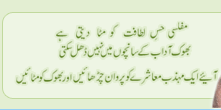|
By Karachian
“If every family in Pakistan gave away a fistful of wheat flour to charity, no one would have to starve” is Parveen Saeed’s simple formula for overcoming the problem of food shortage. But do people really go hungry in Karachi – a city where one sees scores of shrines, seminaries, mosques and restaurants doling out food to the destitute every day?
Apparently they do. A survey jointly conducted by the Federal Urdu University of Arts, Science and Technology and the Raana Liaquat Ali Khan Government College of Home Economics in former District Central some time back showed that food insecurity was very high (81 per cent) among the very low- and low-income households.
Sitting at her small Khana Ghar in Ghuda ki Basti-3, 25 kilometres from the city centre, Ms Saeed said that the place could provide two wholesome meals a day to about 90 people.
As we helped ourselves to a tasty vegetable dish and a freshly baked tandoori nan – costing us a mere Rs2 – she said that while the eatery was essentially a take-away restaurant, food was served on an old divan or a rickety bench for those who wanted to eat out. Those who are too poor to pay for their food enjoy a free meal.
Ms Saeed started a project of similar nature in Surjani Town, but it was closed down when the city government started laying sewers. “I did incur a loss because I had to set up a place in Khuda ki Basti-3 from scratch, but I find that in this locality the number of poor families is high.
Contrary to what people generally believe, an eatery for very poor people could be established with little capital and could be run on a sustained basis. But I haven’t been able to sell the idea to other people,” she said.
Ms Saeed argues that eateries for low-income families could be run on a tight budget. She has employed two people – a chef and an errand boy – with wages of Rs150 and Rs100 a week, respectively. She pays a monthly rent of Rs500 to a local non-governmental organization whose space she occupies.
“We cook three kilos of lentils or about eight kilos of vegetables every day. We use 20 kilos of wheat flour and every fortnight, if we can manage, we have meat curry on the menu. We could do much more if every family in Pakistan gave away a fistful of flour to charity,” she contends.
| 


